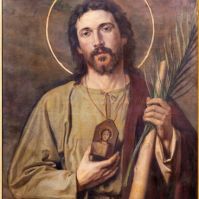 Mary, the mother of Jesus, gets about 15 days each year dedicated to some facet of her memory. In September, her birthday is celebrated. On August 22, the feast day is called "The Queenship of the Virgin Mary," acknowledging the royal dignity of Mary. She has feasts in her honor throughout the year that remember major points in her life and her death. It might seem as if Joseph, the earthly foster-father of Jesus, is forgotten. He may not get the same veneration that Mary does, but he is certainly remembered in March.
Mary, the mother of Jesus, gets about 15 days each year dedicated to some facet of her memory. In September, her birthday is celebrated. On August 22, the feast day is called "The Queenship of the Virgin Mary," acknowledging the royal dignity of Mary. She has feasts in her honor throughout the year that remember major points in her life and her death. It might seem as if Joseph, the earthly foster-father of Jesus, is forgotten. He may not get the same veneration that Mary does, but he is certainly remembered in March.
Joseph is rarely mentioned in the New Testament outside of the gospels of Matthew, Luke and John. He is not mentioned by name in the Gospel of Mark. However, he is instrumental to the story of Jesus. Without his presence, it is likely that the pregnant Mary would have been stoned before Jesus could have been born. It's likely that Joseph died before Jesus began his ministry. As the father of Jesus, it would have fallen to Joseph to take care of his dead son's body. Instead, it is Joseph of Arimathea who entombs Jesus. In addition, Jesus entrusted his mother's care to John the Apostle, which leads most scholars to believe that her husband was dead.
Saint Joseph
In the early days of the church, Joseph presented a theological dilemma. The gospels were clear that Joseph did not father Jesus, but Joseph's paternity was needed to establish the connection of Jesus to King David's lineage. It was difficult for early writers to understand how Jesus was both the Son of God and the son of Joseph, and how Mary was Joseph's wife without an intimate relationship. The debate hasn't ended, as "Josephology," or the theological study of Saint Joseph, is its own theological discipline.
Joseph is the patron saint of the Catholic Church and considered to be its protector, but he has patronage over unborn children, fathers, immigrants, carpenters and realtors. Canada, Korea, Vietnam and Croatia are just a few of the countries that consider him their patron saint. Joseph is highly regarded in the Church even though little is known about him.
March 19 Feast Day
Since the 10th century, Saint Joseph's Day has been celebrated in March. The day typically falls during the Lenten season. Traditionally, feasts honoring Saint Joseph do not include meat. In the late 19th century, Pope Pius IX instituted another feast day for Joseph, which is celebrated following Easter and allows all types of food to be served.
Italy celebrates Father's Day, or Saint Joseph's Day, on March 19. San Giuseppe, the Italian translation of Saint Joseph, is the patron saint of Sicily. Legend says that San Giuseppe saved the island from a famine in the Middle Ages. The islanders promised to give him a feast if rain came, and it did. The fava bean crop was saved and prevented starvation. Celebrations on Saint Joseph's Day include giving to the poor, wearing red clothing, and making and eating zeppole, an Italian pastry.
In Malta, a small island south of Sicily, Saint Joseph's Day is a public holiday. Mass is celebrated in the morning, then families will go out for a picnic in the afternoon. An evening procession or parade might be held.
New Orleans celebrates Saint Joseph's Day much like it does Mardi Gras or St. Patrick's Day, with parades and processions. During the late 19th century, New Orleans was the major port for Sicilian immigrants. Altars are opened for anyone who wants to pay homage to Saint Joseph. The food collected at the altar is later distributed to the poor. Roman Catholics, especially those with Italian or Polish ancestry, are more likely to remember Saint Joseph. Take a few minutes on Sunday, March 19, to reflect on Joseph's story and the sacrifice he made by accepting responsibility for Mary.



